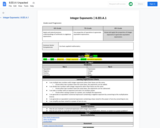
Know and apply the properties of integer exponents to generate equivalent expressions.
- Subject:
- Mathematics
- Material Type:
- Activity/Lab
- Author:
- Liberty Public Schools
- Date Added:
- 04/13/2021

Know and apply the properties of integer exponents to generate equivalent expressions.

Chapter 1. Concepts
Chapter 2. Linear Equations
Chapter 3. Graphing
Chapter 4. Linear Systems
Chapter 5. Polynomial Equations
Chapter 6. Factoring Polynomials
Chapter 7. Rational Expressions
Chapter 8. Radicals
Chapter 9. Quadratic Equations

The Exponents and Radicals module is separated into two parts -- exponents and radicals. Each part has two subtopics. Each subtopic has a video lecture page and a practice assignment. The video lecture page includes guided notes in pdf form and videos that follow the guided notes. There are also Word document versions of the notes in the "files" section of this course for instructor convenience. Each video lecture page also includes supplemental YouTube videos which are optional for students and may be used if further instruction is needed. The practice assignment is a set of exercises in Derivita that correspond to the skills covered in the video lecture.There are also two review assignments in this module -- one for exponents and one for radicals. These assignments cover everything from that part of the module, rather than being broken up into parts like the practice assignments. So there are a total of six assignments in the module and instructors can choose which assignments are most appropriate for their students' needs.This work, by Madilyn Marshall, is licensed under a Creative Commons Attribution 4.0 International License.CC-BY

This intermediate organic chemistry course focuses on the methods used to identify the structure of organic molecules, advanced principles of organic stereochemistry, organic reaction mechanisms, and methods used for the synthesis of organic compounds. Additional special topics include illustrating the role of organic chemistry in biology, medicine, and industry.

This intermediate organic chemistry course focuses on the methods used to identify the structure of organic molecules, advanced principles of organic stereochemistry, organic reaction mechanisms, and methods used for the synthesis of organic compounds. Additional special topics include illustrating the role of organic chemistry in biology, medicine, and industry.

In this activity, students will play a bingo game in order to help practice recognizing radicals used in Chinese characters. Students will be shown a radical, and will then search for a vocabulary word that contains that radical. Students will also practice tones and pronunciation by reading out their winning vocabulary at the end of each round of bingo.

This article describes an approach designed to decrease math anxiety and teach students about the use of mathematical symbols simplifying radicals. A deck of cards is used in a demonstration, and a problem set using real life examples to master the use of radicals is included. This resource is from PUMAS - Practical Uses of Math and Science - a collection of brief examples created by scientists and engineers showing how math and science topics taught in K-12 classes have real world applications.